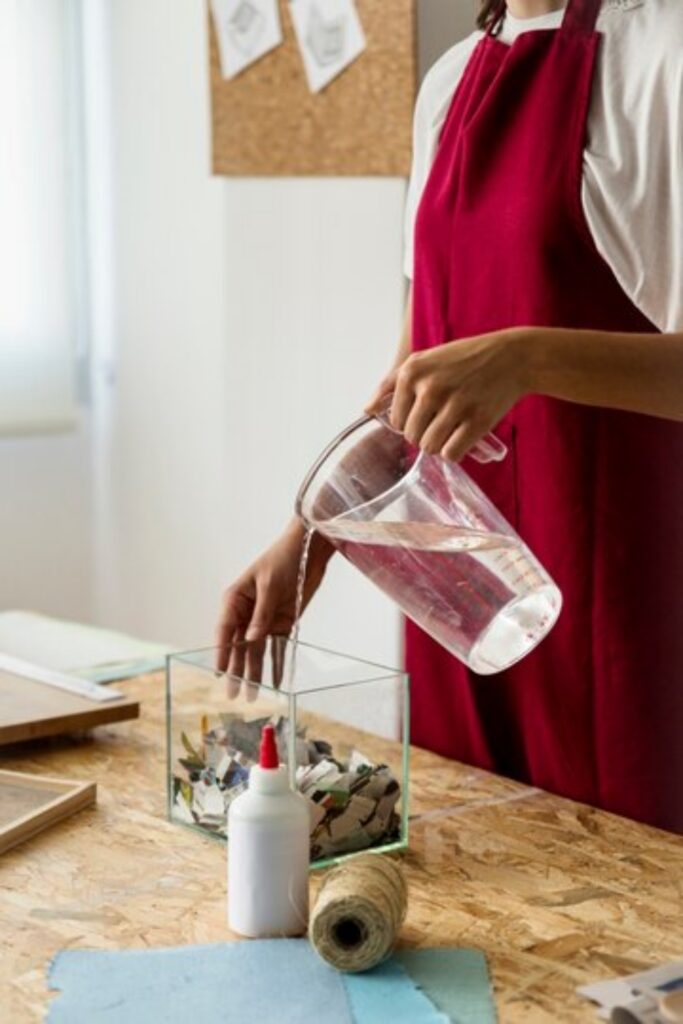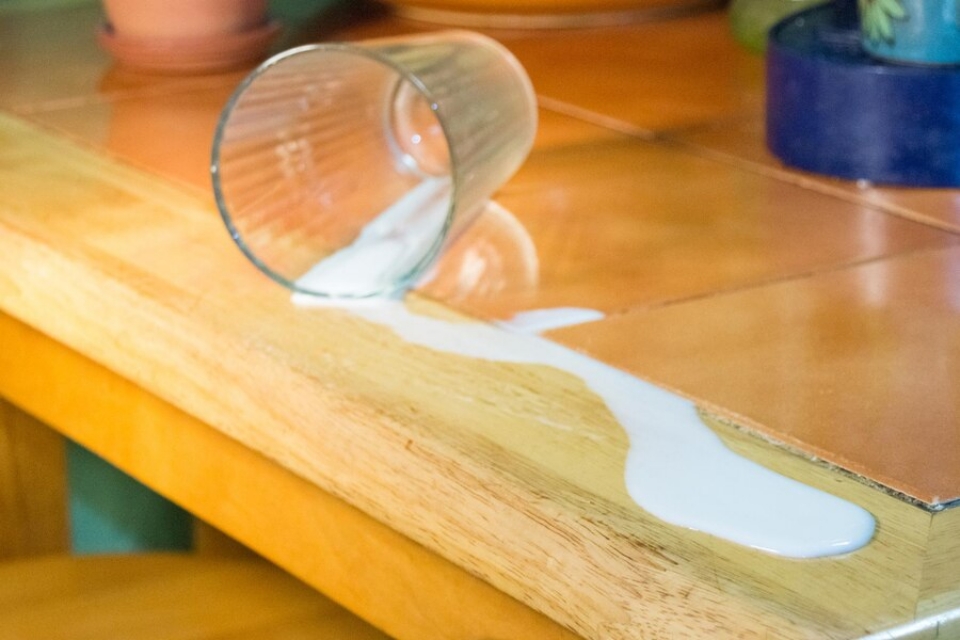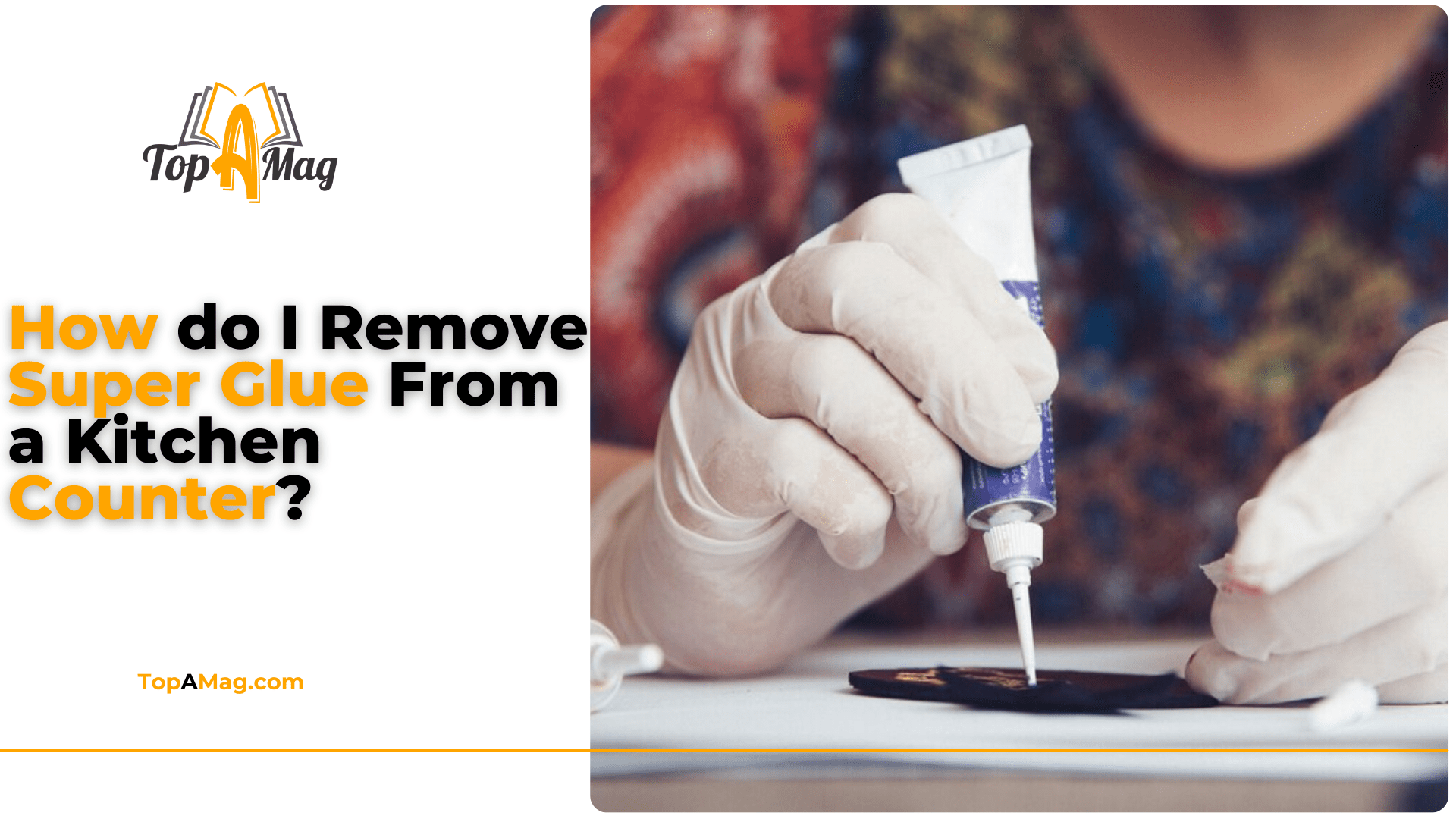Super glue spills can be a nightmare, especially when they land on your kitchen counter. The good news is that with the right techniques and a bit of patience, you can restore your counter to its pristine condition. In this article, we’ll explore various methods to effectively remove super glue from a kitchen counter. We’ll also discuss some preventive measures to avoid such spills in the future. Let’s dive in!
Key Takeaways
- Act quickly to prevent the glue from hardening.
- Always test a small area before applying any removal method.
- Use common household items like acetone, vinegar, or soapy water.
- Prevent future spills by taking precautions when using super glue.
- Consider the specific material of your countertop for the best approach.
- Maintain your counter with regular cleaning and protective measures.
Understanding Super Glue and Its Composition
Super glue, also known as cyanoacrylate adhesive, is a powerful bonding agent. It’s renowned for its ability to adhere quickly and strongly to a variety of surfaces. This characteristic makes it a popular choice for many household repairs like adding designs to your kitchen. In the same way, super glue can be a challenge to remove, if spilled.
Initial Steps to Take Before Using Super Glue
Before jumping into the specific methods, it’s crucial to act quickly. The longer the super glue sits on the kitchen counter, the harder it becomes to remove. Here are the initial steps you should take:
- Do Not Panic: Stay calm to avoid spreading the glue further.
- Read the Label: Check the manufacturer’s instructions for any specific removal advice.
- Test a Small Area: Before applying any removal method, test it on a small, inconspicuous area to ensure it doesn’t damage the surface.

Method 1: Using Acetone for Super Glue Strains
Acetone is a common ingredient in nail polish remover and is highly effective at dissolving super glue. Here’s how you can use it:
- Gather Your Supplies: You’ll need acetone, cotton balls, a plastic scraper, and a soft cloth.
- Apply Acetone: Soak a cotton ball in acetone and place it on the glue spot.
- Let It Sit: Allow the acetone to penetrate the glue for about 5-10 minutes.
- Scrape Gently: Use a plastic scraper to gently lift the softened glue from the counter.
- Clean the Area: Wipe the area with a soft cloth to remove any residue.
Method 2: Using Warm Soapy Water on Super Glue
If acetone is not an option, warm soapy water can also be effective, especially on fresh spills.
- Prepare Soapy Water: Mix warm water with dish soap in a bowl.
- Soak a Cloth: Dip a cloth into the soapy water and place it over the glue spot.
- Wait and Scrub: Allow it to sit for a few minutes, then scrub gently with the cloth.
- Rinse and Repeat: Rinse the area with clean water and repeat if necessary.
Method 3: Using Vinegar
Vinegar is a natural and eco-friendly option that can help break down super glue.
- Soak a Cloth in Vinegar: Use white vinegar for best results.
- Apply to Glue: Place the soaked cloth over the glue and let it sit for about 15 minutes.
- Scrape Off the Glue: Use a plastic scraper to lift the softened glue.
- Wipe Clean: Clean the area with a damp cloth to remove any residue.
Method 4: Using Baking Soda and Coconut Oil
For a gentle yet effective approach, consider using baking soda and coconut oil.
- Mix Ingredients: Combine equal parts of baking soda and coconut oil to form a paste.
- Apply the Paste: Spread the paste over the glue spot.
- Let It Sit: Allow the mixture to sit for 10-15 minutes.
- Scrub and Wipe: Use a soft cloth to scrub the area, then wipe clean with a damp cloth.
Preventive Measures
To avoid future super glue spills on your kitchen counter, consider these preventive measures:
- Use Protective Covers: Place a protective cover or newspaper on the counter when working with super glue.
- Work in a Controlled Area: Use a designated area for repairs that is away from your main kitchen counter.
- Keep Cleaning Supplies Handy: Have acetone, vinegar, and other cleaning supplies readily available for quick action.

Dealing with Stubborn Super Glue Stains
Sometimes, despite your best efforts, some glue might remain. For stubborn stains, consider these additional steps:
- Repeat the Process: Sometimes, multiple applications of the removal method are needed.
- Use a Magic Eraser: A magic eraser can help lift the remaining residue without damaging the surface.
- Seek Professional Help: If all else fails, consider hiring a professional cleaner to handle the job.
Additional Tips for Specific Counter Materials
Different kitchen counter materials may require slightly different approaches to safely remove super glue without causing damage. Below are some specific tips for common counter types:
Granite Countertops
Granite countertops are durable but can be sensitive to harsh chemicals. Here’s how to handle super glue on granite:
- Avoid Acetone: Instead of acetone, use a mixture of warm soapy water and a gentle scraping tool.
- Use a Plastic Scraper: Avoid metal scrapers that can scratch the surface.
- Clean Gently: Use gentle pressure to avoid damaging the sealant on the granite.
Quartz Countertops
Quartz countertops are engineered and can withstand various cleaning methods, but caution is still needed.
- Mild Solvents: Use mild solvents like soapy water or vinegar first.
- Test Acetone: If using acetone, test a small area first to ensure it doesn’t discolor the quartz.
- Rinse Thoroughly: Ensure you rinse the area thoroughly to remove any solvent residue.
Laminate Countertops
Laminate countertops are less durable and can be more easily damaged by harsh chemicals.
- Soapy Water First: Start with warm soapy water and a soft cloth.
- Use Vinegar: If necessary, use vinegar instead of stronger solvents like acetone.
- Avoid Excessive Scraping: Gentle scraping is essential to avoid gouging the laminate surface.
Marble Countertops
Marble countertops are particularly sensitive to acidic substances and harsh chemicals.
- Avoid Acetone and Vinegar: Use a mild dish soap solution instead.
- Use a Plastic Scraper: Be very gentle to avoid scratching the marble.
- Seal After Cleaning: Consider resealing the marble after removing the glue to protect the surface.
Wooden Countertops
Wooden countertops can absorb liquids and chemicals, so extra care is needed.
- Mild Soap and Water: Use a mixture of mild soap and water as the first step.
- Sand Gently: If necessary, gently sand the area with fine-grit sandpaper after removing the glue.
- Re-oil or Re-seal: After cleaning, re-oil or re-seal the wood to maintain its finish.
Considerations When Removing Super Glue
When removing super glue, it’s important to consider both environmental and health impacts. Some solvents can be harsh and may release fumes that are harmful to inhale. Here are some tips to mitigate these concerns:
- Ventilation: Ensure the area is well-ventilated. Open windows and use fans to disperse fumes.
- Protective Gear: Wear gloves and, if necessary, a mask to protect yourself from fumes and chemicals.
- Eco-Friendly Options: Opt for eco-friendly and non-toxic methods like vinegar and baking soda whenever possible.
- Dispose Properly: Dispose of any used chemicals and materials according to local regulations to minimize environmental impact.
Common Mistakes to Avoid
When dealing with super glue on a kitchen counter, certain mistakes can make the situation worse. Here are some common pitfalls to avoid:
- Using Metal Scrapers: Metal scrapers can scratch and damage your counter. Always use plastic or soft tools.
- Excessive Force: Applying too much force can damage the counter surface. Be gentle and patient.
- Ignoring the Label: Not reading the manufacturer’s instructions can lead to ineffective or damaging removal attempts.
- Mixing Chemicals: Avoid mixing different chemicals as this can cause harmful reactions. Stick to one method at a time.
- Not Testing First: Always test a small, inconspicuous area before applying any solvent or method to the entire spill.
Long-Term Care and Maintenance
After successfully removing super glue from your kitchen counter, it’s important to maintain the surface to prevent future incidents and keep it looking its best. Here are some tips for long-term care:
- Regular Cleaning: Clean your counter regularly with mild soap and water to prevent the buildup of dirt and grime.
- Avoid Harsh Chemicals: Use gentle cleaning products to avoid damaging the surface.
- Protective Measures: Use cutting boards, trivets, and mats to protect the counter from spills, heat, and scratches.
- Seal and Reseal: For natural stone and wood countertops, ensure they are properly sealed and reseal them as needed to protect against stains and damage.
- Prompt Action: Address spills and stains immediately to prevent them from setting in and becoming harder to remove.
Frequently Asked Questions (FAQs)
- Can I use a nail polish remover to remove super glue from my kitchen counter?
Yes, you can use nail polish remover that contains acetone to remove super glue. Apply it with a cotton ball, let it sit for a few minutes, then gently scrape off the glue.
- Is it safe to use a metal scraper on my kitchen counter to remove super glue?
No, using a metal scraper can scratch and damage your kitchen counter. It’s better to use a plastic scraper or a soft cloth to avoid any damage.
- What should I do if the super glue has dried completely on my counter?
If the super glue has dried, you can try soaking it with acetone or vinegar to soften it before attempting to scrape it off. It may take multiple attempts to fully remove the dried glue.
- Are there any eco-friendly methods to remove super glue from my kitchen counter?
Yes, eco-friendly methods include using vinegar, warm soapy water, baking soda, and coconut oil paste. These methods are effective and safe for the environment.
- How can I prevent super glue spills on my kitchen counter in the future?
To prevent spills, use protective covers or newspapers when working with super glue, designate a specific area for repairs away from the main counter, and keep cleaning supplies handy for quick action if a spill occurs.
Conclusion
Removing super glue from a kitchen counter requires patience and the right approach. Whether you choose acetone, soapy water, vinegar, or a baking soda and coconut oil mix, the key is to act quickly and carefully. By following these methods and preventive measures, you can keep your kitchen counter clean and free from stubborn glue stains.

